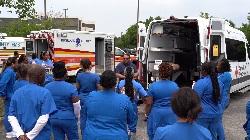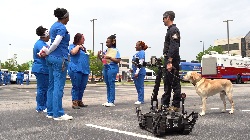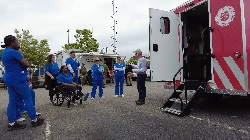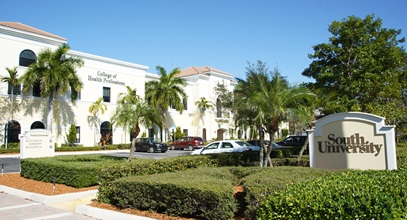 South University, Columbia hosted their annual Disaster Response Exercise on April 24th in partnership with the South Carolina Department of Public Health (DPH) and several community partners.
South University, Columbia hosted their annual Disaster Response Exercise on April 24th in partnership with the South Carolina Department of Public Health (DPH) and several community partners.
The event was designed to provide South University students with real-world experience in emergency response. A variety of interactive stations enabled nursing students to work alongside public health and safety officials in simulated disaster scenarios. Twenty emergency response organizations from the area attended the event.
 Exhibitors included the Department of Public Health, local county Fire Departments, the Metropolitan Medical Response System, South Carolina Healthcare Emergency Amateur Radio Team, the Regional Medical Assistance Team, the Salvation Army, the American Red Cross, a mass casualty evacuation bus, communications trailers, and the Emergency Management Incident Command Center. They brought their vehicles, equipment, and personnel to the campus, some set up in the parking lot, and others in a classroom, to share information about their role in protecting the health and safety of our community.
Exhibitors included the Department of Public Health, local county Fire Departments, the Metropolitan Medical Response System, South Carolina Healthcare Emergency Amateur Radio Team, the Regional Medical Assistance Team, the Salvation Army, the American Red Cross, a mass casualty evacuation bus, communications trailers, and the Emergency Management Incident Command Center. They brought their vehicles, equipment, and personnel to the campus, some set up in the parking lot, and others in a classroom, to share information about their role in protecting the health and safety of our community.
The students were divided into small groups and moved through each exhibit throughout the day. The emergency responders demonstrated their equipment, described their role in responding to various types of disasters, and answered questions from the students. Speakers discussed Behavioral Health during emergencies, Family Emergency Preparedness, Epidemiology and Communicable Disease Investigation, and Medical Countermeasures. Volunteer organizations such as The Community Emergency Response Team and the Midlands Medical Reserve Corps shared information about their volunteers and their roles during emergencies. At the conclusion of the event, both students and the emergency responders expressed their enthusiasm and were grateful for the event.
 Interactive discussions on Behavioral Health during emergencies, Family Emergency Preparedness, and Communicable Disease Investigation highlighted the multifaceted challenges responders face. Such events are more than exercises—they’re lifelines to future preparedness. They teach future professionals and remind us all of the strength in partnerships during uncertain times.
Interactive discussions on Behavioral Health during emergencies, Family Emergency Preparedness, and Communicable Disease Investigation highlighted the multifaceted challenges responders face. Such events are more than exercises—they’re lifelines to future preparedness. They teach future professionals and remind us all of the strength in partnerships during uncertain times.




